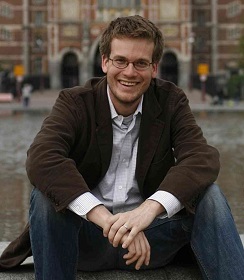De Amerikaanse schrijver John Green werd geboren in Indianapolis, Indiana, op 24 augustus 1977. Green ging op vijftienjarige leeftijd naar een kostschool in Birmingham. Hij studeerde Engels en godsdienstwetenschappen en besloot dat hij priester wilde worden in de Anglicaanse Kerk. Hij werkte enkele maanden als aalmoezenier in een kinderziekenhuis in Ohio, waar hij veel kinderen zag sterven. Daar besloot hij dat hij een boek wilde schrijven over mensen die moeten leren leven met de dood van iemand die ze liefhadden. Green recenseerde voor Booklist en maakte radioprogramma’s, voordat hij zich fulltime richtte op het schrijven van boeken. In 2011 heeft hij via het Nederlands Letterenfonds twee maanden in Amsterdam doorgebracht om zijn laatste boek “The Fault In Our Stars” te voltooien. Green ontving in 2006 de Printz Award voor zijn debuutroman “Looking for Alaska”. Green is tevens bekend van een internetproject op YouTube waarin hij met zijn broer Hank Green het gehele jaar 2007 slechts communiceerde in de vorm van Videoblogs. Samen met Hank vormt John de Vlogbrothers. Hun YouTube project, waar zij om beurten al meer dan 1000 video’s maakten, bestaat nog. Hun video’s werden door inmiddels meer dan twee miljoen mensen bekeken.
Uit: Looking for Alaska
“Before I got here, I thought for a long time that the way out of the labyrinth was to pretend that it did not exist, to build a small, self-sufficient world in a back corner of the endless maze and to pretend that I was not lost, but I was home. But that only led to a lonely life accompanied only by the last words of the already-dead, so I came here looking for a Great Perhaps, for real friends and a more-than-minor life. And then I screwed up and the Colonel screwed up and Takumi screwed up and she slipped through our fingers. And there’s no sugar-coating it: she deserved better friends.
When she fucked up, all those years ago, just a little girl terrified into paralysis, she collapsed into the enigma of herself. And I could have done that, but I saw where it led for her. So I still believe in the Great Perhaps, and I can believe in it in spite of having lost her.
Because I will forget her, yes. That which came together will fall apart imperceptibly slowly, and I will forget, but she will forgive my forgetting, just as I forgive her for forgetting me and the Colonel and everyone but herself and her mom in those last moments she spent as a person. I know now that she forgives me for being dumb and scared and doing the dumb and scared thing. And here’s how I know:
I thought at first she was just dead. Just darkness. Just a body being eaten by bugs. I thought about her alot like that, like someone’s meal. What was her – green eyes, half a smirk, the soft curves of her legs – would soon be nothing, just the bones I never saw. I thought about the slow process of becoming bone and then fossil and then coal that will, in millions of years, be mined by humans of the future, and how they would heat their homes with her, and then she would be smoke billowing out of a smokestack, coating the atmosphere. I still think that, sometimes, I think that maybe “the afterlife” is just something we made up to ease the pain of loss, to make the time in the labyrinth bearable. Maybe she was just matter, and matter gets recycled.
But ultimately I do not believe that she was just matter. The rest of her must be recycled, too. I believe now that we are greater than the sum of our parts. If you take Alaska’s genetic code and you add her life experiences and the relationships she had with people, and then you take the size and shape of her body, you do not get her. There is something else entirely. There is a part of her greater than the sum of her knowable parts. And that part has to go somewhere, because it cannot be destroyed.”

John Green (Indianapolis, 24 augustus 1977)
